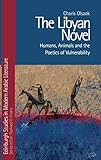The Libyan Novel : Humans, Animals and the Poetics of Vulnerability / Charis Olszok.
Material type: TextSeries: Edinburgh Studies in Modern Arabic Literature : ESMALPublisher: Edinburgh : Edinburgh University Press, [2022]Copyright date: ©2020Description: 1 online resource (320 p.)Content type:
TextSeries: Edinburgh Studies in Modern Arabic Literature : ESMALPublisher: Edinburgh : Edinburgh University Press, [2022]Copyright date: ©2020Description: 1 online resource (320 p.)Content type: - 9781474457453
- 9781474457477
- 892.7099612 23
- online - DeGruyter
| Item type | Current library | Call number | URL | Status | Notes | Barcode | |
|---|---|---|---|---|---|---|---|
 eBook
eBook
|
Biblioteca "Angelicum" Pont. Univ. S.Tommaso d'Aquino Nuvola online | online - DeGruyter (Browse shelf(Opens below)) | Online access | Not for loan (Accesso limitato) | Accesso per gli utenti autorizzati / Access for authorized users | (dgr)9781474457477 |
Frontmatter -- Contents -- Series Editor’s Foreword -- Acknowledgements -- Note on Translation and Transliteration -- Introduction: A Nation of Others -- Part I Survival -- 1. Animal Fable in Novels of Survival -- 2. The Primordial Turn -- Part II Signs and Cityscapes -- 3. God’s Wide Land: War, Melancholy and the Camel -- 4. Absent Stories in the Urban Novel -- Part III Children of the Land -- 5. Too-Long-a-Tale -- 6. ‘Une histoire de mouche’: Th e Libyan Novel in Other Voices -- Afterword: Breaking Fevers and Strange Metamorphoses -- Notes -- Bibliography -- Index
restricted access online access with authorization star
http://purl.org/coar/access_right/c_16ec
Traces the developments in Libyan novel writing from the 1970s to 2011 through encounters between human, animal and landLocates the study of internationally renowned authors Ibrahim al-Kuni (b. 1948) and Hisham Matar (b. 1970) within the context of their Libyan compatriotsAnalyses works by al-Sadiq al-Nayhum and Ahmad Ibrahim al-Faqih, previously neglected in English-language scholarshipAdds nuance to the understanding of animals as straightforward political allegory, and brings a non-western, Islamic perspective to the study of the ‘creaturely’ Tackles postcolonial themes from the little-studied case of Italy and LibyaSuggests new approaches to postmodernism within a politically and economically isolated countryAnalysing prominent novelists such as Ibrahim al-Kuni and Hisham Matar, alongside lesser-known and emerging voices, this book introduces the themes and genres of the Libyan novel during the al-Qadhafi era. Exploring latent political protest and environmental lament in the writing of novelists in exile and in the Jamahiriyya, Charis Olszok focuses on the prominence of encounters between humans, animals and the land, the poetics of vulnerability that emerge from them, and the vision of humans as creatures (makhlūqāt) in which they are framed. As Libya transforms into a dictatorial, rentier state, animals represent multi-layered allegories for human suffering, while also becoming focal points for empathy and ethics in their own right. Within reflections on Italian colonisation and ensuing forms of political and social oppression, concomitant with oil, urbanisation, exile and war, staged in remote deserts, isolated coastlines and neglected city parks, The Libyan Novel examines how physical, emotional and intellectual hardship prompts empathetic gazes across species lines. Through engagement with the folkloric and Sufi traditions that define the country’s past and shape its modern fiction, it further traces the spiritually, environmentally and politically holistic imaginings that contest a precarious reality.
Mode of access: Internet via World Wide Web.
In English.
Description based on online resource; title from PDF title page (publisher's Web site, viewed 27. Jan 2023)


